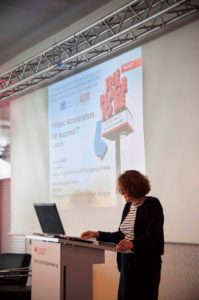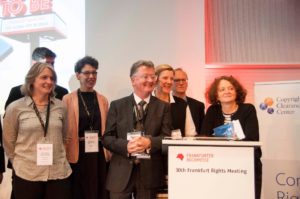On 18 October 2016, FEP participated in the 2016 edition of the Frankfurt Rights Meeting, an annual conference and networking opportunity for professionals engaged in international rights licensing and promotion. This year’s theme was “Surprising Successes in Challenging Times”, as the speakers focused on unexpected sources of commercial success of translations. The event, which had one session organised in the framework of the Aldus project, was hosted by Isabelle Bleecker, VP, Director for International Rights at Perseus Books, Hachette Book Group, US.
Kris Kliemann, Rights Consultant from the US, made a presentation called “Digging deeper: On mining the backlist”, in which she provided advice on exploiting the value of backlist titles. Mrs Kliemann first dispelled the notion that backlist titles are just “old” titles: books can have a rolling time of 12 months, and backlist is, sales-wise, the biggest selling category all in all (if only by the mere number of titles); being backlist, she argued, is the goal of every good front list title. Moreover, with backlist titles one has more knowledge and evidence to use when proposing a deal. In giving suggestions on what, where and how to mine, Mrs Kliemann reminded the audience that deals can also be found at the bottom of one’s email inbox. She then highlighted the relevance of a series of special circumstances that can give backlists a new lease of life: a new book from the same author is a straightforward opportunity to mine a backlist (with different options according to whether one published said author previously, is starting now, etc.), but other occasions can come from anniversaries, authors’ birthdays, historical events, news items and more. Renewing or relicensing old deals helps keeping control of the backlist and thorough tracking of sales and transactions facilitates greatly the assessing of value and thus setting of price for a licence on a backlist title. Finally, Mrs Kliemann provided some advice about timing: finding the right moment for marketing can be a difficult exercise, which depends on several elements; the decision-making cycle for a book can be long, and sometimes the backlist categorisation can be an arbitrary distinction; and it is always better have a pitch at the ready. All in all, the basic message was that being a miner of the backlist can lead to striking gold.
John Donatich, Yale University Press, US, spoke about “Going further: Translations in the US market”, to provide some advice on how to enter a market traditionally difficult for foreign literature. Mr Donatich first outlined some trends in the history of literature and translation in the US: different areas have been popular there at different times – Latin America, Japan, France, etc. – and now the market seems to be opening up to minor languages and previously neglected areas, which represents a new opportunity. Still, the overall market for translations in the US remains small: while statistics are quite difficult to figure out anyway (for instance the Library of Congress does not insist on translation as metadata in its handling of legal deposit), research by the University of Rochester seems to confirm the traditional knowledge that places the level of translations in the US market at some 3% (of which 0.7% literature and poetry). The situation is allegedly similar in the UK, while other European countries have higher and often much higher shares. Moreover, the most prolific translation publisher is now Amazon Crossing, which has the negative connotation that those books are not in bookstores. The source languages for translation are mainly European (with French, Spanish and German in the lead). Issues related to culture and assimilation limit the demand for translated literature; in addition, it can be expensive to do translations, and it can be difficult to find good ones, not least because one cannot work with the author (unless author and translator are the same person). Still, there are opportunities; Yale UP has been publishing some 260 titles per year lately, 10% of which translations (they’re one of the top 10 translators). Tips for approaching the US market – often rights managers can help publishers on those issues – include customising presentations, getting opinions from other publishers, approaching local experts (academics, for example) to champion the book, producing extracts in English and trying not to duplicate the catalogue of the publisher to which one wants to sell the rights. From the audience, Anne-Solange Noble, Director of Foreign Rights at Gallimard, France, added that it’s better to approach a US publisher after having sold rights to a number of other foreign publishers.
Mr Donatich illustrated his points through three success stories of translations, among which that of A Little History of the World, a children’s history book first published in German in 1935 and translated in 18 languages soon after; the book, which had not been noticed in the US at the time, was translated by Yale UP in 2005 and went on to sell 500,000 copies.
The next session, organised in the framework of Aldus, was called “Promoting translation rights with the help of prizes: Accelerators for success?” Anne Bergman-Tahon, Director of the Federation of European Publishers, provided some information about the European Union Prize for Literature: selection criteria, cyclic nature (periodically involving all the countries participating in the European Commission’s Culture Programme), organising consortium (FEP, plus the European Writers’ Council and the European and International Booksellers Federation, with the support of the European Commission) and the process, which involves forming national juries, the choice of a winner per country, the translation of extracts of the wining books, the publication of a book with the extracts, promotion of books and authors at book fairs and an award ceremony in Brussels. The winning books grant extra points towards the EU translation programme, increasing the chances of a proposal to be adopted if it contains EUPL winning titles. Mrs Bergman-Tahon also highlighted the EUPL appointments at the Fair and the publication of a book of extracts of all the EUPL Dutch-speaking winners (The Netherlands and Flanders being Guests of Honour at Frankfurt this year) and recalled that the session had been organised in cooperation with the Aldus project, which aims among other things to promote the EUPL winners.

Pierre Astier, from the Astier-Pécher Literary & Film Agency, France, recalled his background of publisher turned agent, mainly representing French-speaking authors, pointing out that when he started this new career in 2006 a literary agent needed a global approach and would go through exciting times. Mr Astier explained that an agent, to do his/her job, needs good texts, a network of reliable clients (publishers, producers, intermediaries – and also critics, juries, festivals, cultural policy makers, etc.), enthusiasm, curiosity and understanding of book market; also flare and alchemy, which are harder to acquire. He said that small markets could be very stimulating for an agent, stressing how the question of languages is central to the strategy of an agent: the language in which authors write and publishers publish bring about choices to make, with regards to linguistic coverage, publishers to sell translation rights to, producers to sell film rights to, and so on. Language can be a barrier, but also an exciting challenge. In this scenario, Mr Astier brought the example of Goce Smilevski, Macedonian author winner of the EUPL 2010, whom he discovered via a translator from Macedonian to French; intrigued by the subject of his book Freud’s Sister, the agency decided to represent him and, when he won the Prize, they used the opportunity of promoting the book at the Frankfurt Book Fair, where scouts from many countries got to read the extract in English made for the EUPL. One month later the title had been sold to several big publishers, and when it was bought by Penguin in the US, the English translation opened the way to many others (all made with the author’s approval). The book went on to be translated in 25 languages and become available in 35 countries (selling up to 10,000 copies in many of them). Mr Astier explained also how this experience helped his agency discover and understand the book markets of the Balkans; as the post-war decades saw a huge growth in the number of countries worldwide, this increased the opportunities for rights sales in different languages, and Mr Astier’s agency now has a catalogue of 55 languages. Mr Astier spoke about the importance of small and minority languages and bibliodiversity, stressing once again the fascinating developments happening all over the world, and stating that their focus was on engaged and passionate people, independently on the size of their linguistic areas. He insisted on the role of languages, books and literature in a post-empire world, pointing out that Central-Eastern European countries had in some cases developed large, thriving book markets. He said the EUPL was well known, especially in those markets, and used it as an example to show that a continental literature was emerging in Europe, also greatly helped by translation grants.

The following sessions included a focus on Hungary, by Bence Sárközy, Director of Libri Publishing, who gave advice on how to address the country’s book market with his presentation “Against all odds: Making it work in a difficult market”; a focus on the UK, in which Gudrun Hebel, from Agentur Literatur, Germany, and Katharina Bielenberg, from MacLehose Press, UK, in their “Weird and wonderful: Journey of an exceptional title”, told the story of the improbable success of Norwegian author Lars Mytting and his book on the art of chopping wood, which was marketed with emphasis on its literary aspects and became a big success at home and in several other countries. Finally, Michael Healy, Director of Copyright Clearance Center, USA, gave an overview of international rights licensing in his presentation “Sometimes overlooked but surprisingly powerful: Copyright licensing around the world”.
 By
By 

















